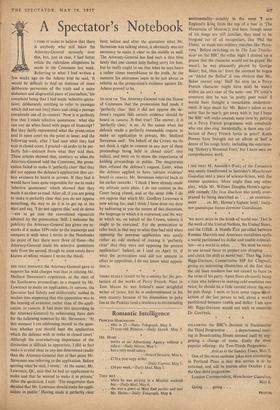A Spectator's Notebook
I FIND IT HARD to believe that there is anybody who still takes the Attorney-General seriously over this, but, just in case, I had better refute the ridiculous allegations he made in the Commons last week. Referring to what I had written a few weeks ago on the Adams trial he said, 'It would be difficult to find an instance of more deliberate perversion of the truth and a more dishonest and disgraceful piece of journalism,' his complaint being that I had made 'selective quota- tions, deliberately omitting to refer to passages which did not suit [myj thesis and citing a passage completely out of its context.' Now it is perfectly true that I made selective quotations: what else can one do when faced with pages of transcript? But they fairly represented what the prosecution said in open court on the point at issue; and the following week, after I had seen what they had said in closed court, I printed—in order to be per- fectly fair—extracts from what they said then. These articles showed that, contrary to what the Attorney-General told the Commons, the prose- cution failed to make it 'perfectly clear' that they did not oppose the defence's application that cer- tain evidence be heard in private. If they had it would have been quite impossible for me to make 'selective quotations' which showed that they made it as clear as mud. After all, if you are going to make it perfectly clear that you do not oppose something, the way to do it is to get up at the start and say, 'I do not oppose this,' and sit down —not to go into the convoluted rigmarole adopted by the prosecution. Still, I welcome the publicity the Attorney-General has given my re- marks if it makes MPs refer to the transcript and compare it with what I wrote in the Notebooks (in point of fact there were three of these—the Attorney-General made his selective quotations only from the second, though he must surely have known at whose request t wrote the third).
* * *


































 Previous page
Previous page